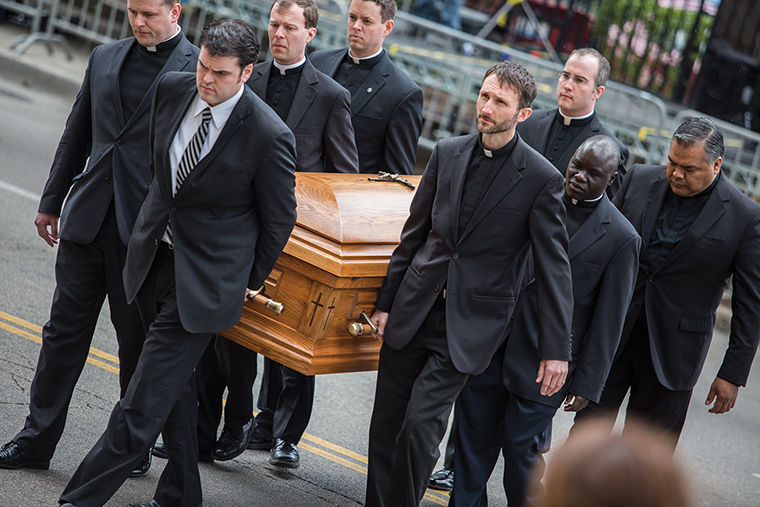Chicago mourns death of Cardinal Francis George
Pallbearers carry Cardinal Francis George’s casket on April 23 at Holy Name Cathedral, 735 N. State St. He was later buried at All Saints Cemetery in Des Plaines, Illinois.
May 4, 2015
After battling cancer for years, Cardinal Francis George died April 17 at his Gold Coast residence. He was 78 years old.
George was appointed as Chicago’s archbishop by Pope John Paul II in 1997, becoming the first Chicago native to be named the city’s archbishop. George’s admirers and members of Chicago’s Catholic community are still feeling the loss and highlighting what he contributed to the community.
George took a lot of heat during his time as the archbishop, said Rex Pillai, associate pastor at Saint Clement Parish. From his opinions on sexual abuse scandals to gay marriage, George had strong opinions Catholic doctrine and was sure to make them known, Pillai said.
Growing up on the Northwest side, George attended St. Pascal elementary in the Portage Park neighborhood. After earning master’s degrees in philosophy and theology and a doctorate in sacred philosophy, George was appointed as the archbishop of Portland, Oregon, in 1996. Less than a year later, John Paul appointed him the eighth archbishop of the Chicago archdiocese taking the place of the late Cardinal Joseph Bernardin, according to the Archdiocese of Chicago’s website.
“He shared his faith and guided the people in the ways of God, whether it was abortion or moral issues that the church believes in,” Pillai said. “Some people saw him as a very strict disciplinarian because he was convinced of [the Catholic teachings] and he made it known.”
Although George had strong opinions, he was still liked by Chicago’s Catholic community, Pillai said.
“In his own right, I think he was a great man,” Pillai said. “He was very different from the present Archbishop Blase Cupich, but we considered him as an intellectual.”
Peter Wojcik, the chief strategy officer at the Archdiocese of Chicago, worked closely with George. Wojcik teamed with George on making sure Chicago Catholic schools were academically performing.
“I knew Cardinal Francis very well,” Wojcik said. “One of the biggest support he gave to the community was making sure we had the best Catholic schools and making sure we had diverse priests.”
Wojcik said George sought out priests from all over the world to make sure parishioners were welcome and saw familiar faces in their parish all the time.
When George was first diagnosed with cancer in 2006, he had his bladder and prostate removed. The cancer returned in March 2014 after he submitted his resignation to Pope Benedict XVI in 2012. He remained the archbishop of Chicago until Blase Cupich succeeded him.
“He certainly was a man of convictions and wasn’t afraid to talk about some of those convictions,” Pillai said. “These were convictions he believed would help the archdiocese because he was the leader, so it was his responsibility to lead them in the right path.”
Cardinal George’s funeral took place on April 23 at Holy Name Cathedral, 735 N. State St., and he was later buried at All Saints Cemetery in Des Plaines, Illinois.
Bob Sprengel, a Catholic Logan Square resident, said he watched the mass online.
“The service was beautiful and cross-cultural because they gave readings in three different languages,” Sprengel said.
Sprengel said he was sad that George had passed, but that George left a legacy that would not be forgotten.
“I think he stood up for what the church teaches dogmatically,” Sprengel said. “He was put in a position where he had to defend the church’s traditional viewpoints on matters that were controversial.”








